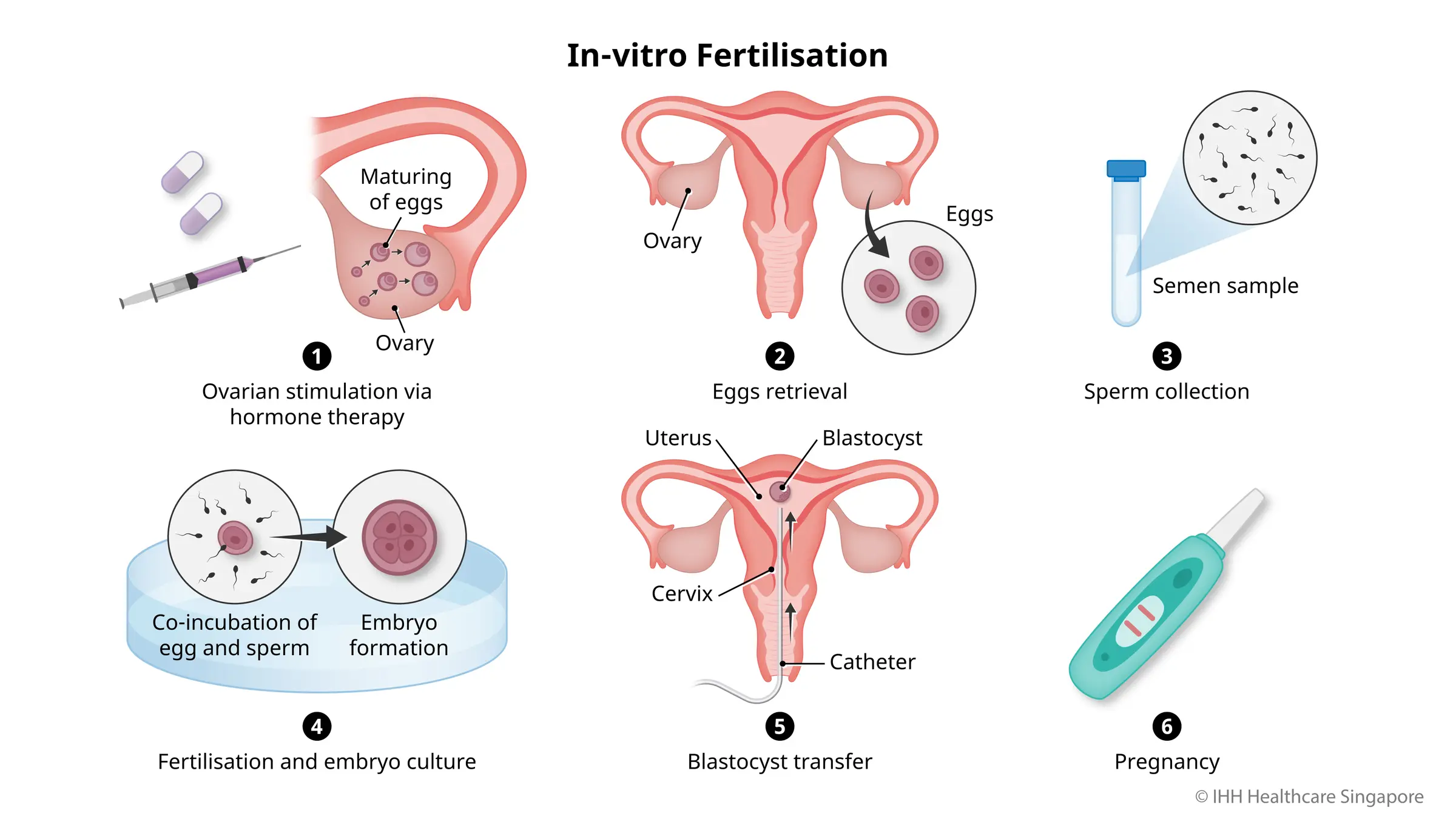What is IVF?
IVF is a type of assisted reproductive technology where mature eggs are retrieved from the ovaries. To retrieve mature eggs, women have to undergo egg retrieval surgery which is a minimally invasive surgical procedure.
These eggs are combined with sperm in a laboratory setting to fertilise. The resulting embryo is then transferred back into the mother’s uterus to establish pregnancy.
Why do you need IVF?
Your doctor may recommend IVF:
- If other assisted reproductive techniques are unsuccessful. Examples of other assisted reproductive techniques include ovulation induction or intrauterine insemination.
- To preserve fertility (e.g. Women diagnosed with cancer may freeze their eggs before starting on cancer treatment).
- To treat infertility due to:
- Blocked, damaged, missing or removed fallopian tubes.
- Decreased sperm count or low sperm motility (the ability of sperm to swim).
- Ovulation disorders, premature ovarian failure, endometriosis.
- Idiopathic infertility (unexplained reasons).
- Genetic disorders.
What are the risks and complications of IVF?
As a woman undergoing IVF, you may encounter the following risks or complications:
- Ovarian hyperstimulation syndrome. Fertility drugs such as human chorionic gonadotropin (HCG) can cause your ovaries to swell and hurt. You may also experience abdominal bloatedness and fluid retention; in severe cases, hospitalisation may be required. These symptoms generally last for a week but may last for several weeks if you become pregnant.
- Complications related to egg retrieval. When collecting your eggs with a needle, there is a risk of bleeding, infection or damage to your bowel, bladder or blood vessel.
- Ectopic pregnancy. Less than 5% of women who undergo IVF may experience an ectopic pregnancy, where the fertilised egg implants outside the uterus. As the fertilised egg can't survive outside the uterus, the pregnancy cannot proceed and can be dangerous for the woman.
- Miscarriage. If you conceive through IVF with fresh embryos, the rate of miscarriage is similar to natural conception — about 15% to 25%.
- Multiple births. When more than one embryo is transferred to your uterus, there is an increased risk of multiple births. Multiple births are associated with a higher risk of premature delivery and low birth weight.
- Premature delivery and low birth weight. If you conceive through IVF, you may deliver early and your baby may have a low birth weight.
How do you prepare for IVF?
Before undergoing IVF treatment, we encourage you to consider the following actions.
Practise self-care and compassion
Apart from the clinical aspects of IVF treatment, it is also important to address your emotional needs. It is normal to experience feelings such as dismay, denial, sadness, and confusion. You may also feel stress, anxiety and self-blame.
It is important to acknowledge that fertility disorders are common and unexplained. Studies show that effective stress management increases the chance of pregnancy. This is because stress may interfere with the immune system and increase the likelihood of a woman’s body rejecting an embryo. We encourage partners to support each other throughout this journey.
If you would like to seek additional help, we offer counselling services by trained psychologists and counsellors.
Optimise your nutrition and lifestyle
It is important to establish optimal health before embarking on any fertility treatment. A balanced, healthy diet with regular exercise is key to optimising your chances of success.
In general:
- Women planning for pregnancy should ensure a daily intake of at least 400 micrograms of folate. Folate reduces birth defects incidents affecting the brain and spinal cord. Dietary sources rich in folate include a wide variety of vegetables, fruits, legumes, wholegrain bread and cereals.
- Men may require additional supplementation of minerals such as zinc and carnitine.
- Both men and women should aim for a healthy body mass index (BMI) through a healthy diet and regular exercise. Obesity can reduce the chances of conceiving and increase pregnancy complications.
- Both men and women should stop smoking and avoid alcohol. Smoking reduces the chance of a successful pregnancy, and may lead to an increased incidence of miscarriage, poorer response to fertility medication, damaged sperm DNA, and reduced sperm count.
- Both men and women should consume sufficient iron and vitamin C to reduce the risk of anaemia.
Speak to your doctor to understand any additional supplements or lifestyle changes you might need to make.
Seek support
Find individuals among your family and friends whom you believe are supportive and understanding. Inform them that you need their help and support during this time. Let them know how they can help both of you practically and emotionally.
You can also consider attending support groups where you can meet and talk to other couples on a similar journey. This helps you to be supported, understand how others have coped and feel less alone on the IVF journey.
What can you expect for IVF?

We take pride in empowering our patients with education and knowledge so they can make the right decision together with their doctors. Before undergoing treatment, you and your partner will:
- Undergo tests and preparation.
- Attend counselling sessions to understand the requirements for IVF treatment.
Typical IVF cycles take about 3 – 4 weeks. However, this duration may lengthen, depending on the number of steps in the cycle.
Stimulating and monitoring of follicle growth
Your doctor will:
- Prescribe natural hormonal medications to stimulate the ovaries to produce oocytes (eggs). These medications help the ovaries to produce multiple available eggs (instead of the typical single egg) so as to increase the chance of getting more mature oocytes for fertilisation.
- Monitor follicle growth to determine the best time for an oocyte retrieval.
The number of eggs produced and how long it takes for them to develop depends on ovarian function and state of health.
Oocyte (egg) retrieval
Once the oocytes (eggs) are mature, they are retrieved. You will need to fast for 6 hours before the procedure. The retrieval takes about 30 minutes and is done under moderate sedation to keep you pain-free, comfortable and relaxed.
Sperm collection
In addition to retrieving mature eggs for IVF, a semen sample is also collected. This may be done before or after egg retrieval. Semen samples may be frozen and stored to counter any foreseeable difficulties in the collection.
Insemination, fertilisation and embryo culture
Once the eggs have been retrieved, your embryologist will culture them. Washed sperm may be mixed with the egg in a special chamber or directly injected into the egg. This is known as intracystoplasmic sperm injection, or ICSI.
After that, the sperm and egg are incubated and monitored daily to make sure that a healthy embryo develops. Our embryologist will contact you 1 day after the egg collection to update you on the fertilisation status of the embryos.
Blastocyst transfer
On day 5, the best blastocysts (developed embryos) are transferred into the mother’s uterus through a very fine catheter that is passed through the cervix. We perform this procedure under abdominal scan guidance to ensure the ideal placement of the blastocysts. After the embryo transfer, we recommend patients obtain adequate rest and refrain from strenuous activities for 2 weeks.
Blastocyst vitrification, if required
If there are excess blastocysts of good quality, we will consult you and your partner to ask if you would like to store these for future use.
Pregnancy testing
2 weeks after the blastocyst transfer, we will perform a routine urine or blood test to test for pregnancy.
First ultrasound to determine viability
If the pregnancy testing yields a positive result, your fertility specialist may perform a fetal viability scan after 2 weeks to confirm the successful pregnancy.
Care and recovery after IVF
We understand that the IVF journey can be an emotional and stressful journey. While every effort is taken in each IVF cycle to optimise the chance of success, a successful outcome cannot be guaranteed.
It is helpful to let go of anxiety and focus on other aspects of the relationship between you and your partner, which is just as important.
The IVF journey is not easy. Know that you and your partner are doing your best and remember to affirm yourself and your partner for that.
Complementary treatments
Discuss with your doctor should you wish to undergo complementary treatments during the IVF cycle.
In certain studies, acupuncture has been shown to improve pregnancy rates when done in conjunction with the IVF cycle.
Depending on your doctor’s instructions, it is possible to enjoy other activities in tandem with the treatments, such as massage or exercise.








